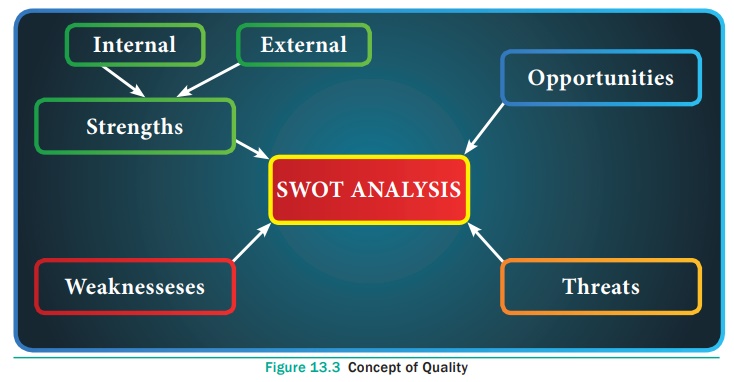Textiles and Dress Designing - Concept of Quality | 12th Textiles and Dress Designing : Chapter 13 : Finishing Entrepreneurship
Chapter: 12th Textiles and Dress Designing : Chapter 13 : Finishing Entrepreneurship
Concept of Quality
Concept of Quality
Quality of a company can be rightly called as the heart of the
company and its assurance as life line. Quality control may be defined as the
systematic control of all the variables influencing the quality of the final
product.
·
Joseph M. Juran defines Quality as the fitness for use or purpose.
·
W.Edwards also describes Quality as predictable degree of
uniformity and dependability at low cost and suited to market.
·
The totality of features and characteristics of a product or
service that bear on its ability to satisfy or implied needs of customers is
the definition of quality as stated by ISO 9000.
Quality assurance means the degree to which the product actually
confirms to the design specification which means manufacturing specifications
of the product. This involves appearance, life, safety maintenance and other
features of the product. Uniformity and acceptable quality of a product
predicts the quality assurance of the product.
These two concepts of quality control and quality assurance lay a
foundation for the development of the company. To a lay man, quality is proper
use of the product till its lifetime as stated by the company.
Total Quality Management commonly known as TQM is also called
Total Quality Improvement or Total Quality Control. This process starts from
selection of raw materials which also includes safety measures and finally
evaluation, packing and despatch.

Better quality gives better productivity. So the entrepreneurs have to devote their time for research and development. The analysis made for external and internal
environment together is called SWOT analysis. It refers to identifying
of Strengths and Weaknesses of the Organisation and Opportunities and Threats
of the environment.
Techniques and Benefits of Quality Control
There are two techniques of quality control and assurance. They
are inspection and statistical quality control.
Inspection implies comparing quality characteristic of a product with
predetermined standards or 1accepted specifications of quality. It is concerned
with quality of design. It is a verification covered out after the product in
manufactured. It ensures the standard of a product to be supplied to the
customers.
Statistical Quality Control regulates the process of manufacturing to take
corrective action for producing standard products. It is concerned with quality
of conformance. It is defined as the technique of applying statistical methods
based up the mathematical theory of probability to quality control problems. It
is done with the purpose of establishing quality standards and maintaining
adherence to those standards in the most economical manner.
Following are the benefits of quality control;
·
It minimises the wastage and scrap
·
Increases the process efficiency
·
Reduces labour cost
·
Improves the quality of the product and services
·
Improves the sales turnover
·
Increases customer satisfaction
·
Reduces inspection cost and customer complaints
·
Improves the operating efficiency of quality consciousness
·
Conserves manpower resources
·
Determines prices at competitive level and increases the profit.
Related Topics